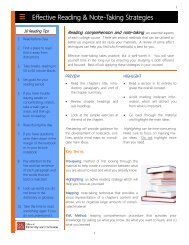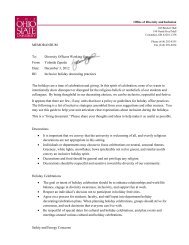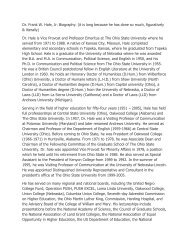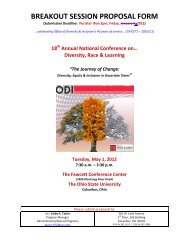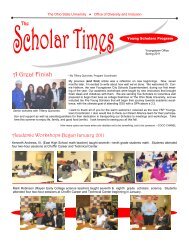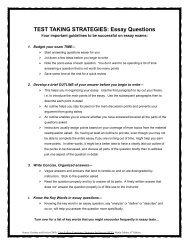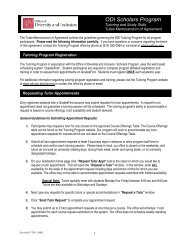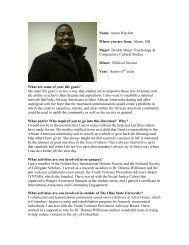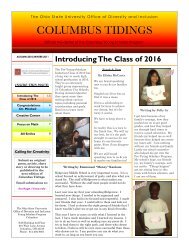Qué Pasa, OSU? - go to site
Qué Pasa, OSU? - go to site
Qué Pasa, OSU? - go to site
- No tags were found...
You also want an ePaper? Increase the reach of your titles
YUMPU automatically turns print PDFs into web optimized ePapers that Google loves.
Education Reform and Smoking Cessation ResearchParental Lessons Lead <strong>to</strong> Inquiry in ActionBy Tomás Moreno-Vasquez, Junior, Departments of Economics, Psychology, and NeuroscienceAs a Junior majoring in economics,psychology, and cognitive neuroscience, Icannot emphasize enough the lessons myparents, Colombian immigrants, taught mein terms of working hard at accomplishinga great deal while helping people improvetheir life. My parents’ influence has led me<strong>to</strong> working both on education reform andsmoking cessation research.Students for Education Reform is acampus organization whose <strong>go</strong>al is <strong>to</strong> collectivelywork <strong>to</strong>ward closing the achievementgap. People come <strong>to</strong> this countryevery day <strong>to</strong> achieve a better life for themselvesand their children, but they areconstantly disappointed by inadequateeducational opportunities. Schools in highpoverty areas across the country are consistentlyunderperforming compared <strong>to</strong> thosein suburban districts. Some states haveinstalled laws shielding tenured teachersfrom termination, leaving many youngup and coming educa<strong>to</strong>rs out of jobs.Furthermore, many states tightly controltheir number of charter schools, (publicschools that are run by a third party ratherthan by the <strong>go</strong>vernment). These charterschools can function as labora<strong>to</strong>ries, providingexcellent alternative models forour current school systems. Changes arenumerous and readily demonstrable. Forexample, lengthening school days, requiringstudents receive tu<strong>to</strong>ring, and manda<strong>to</strong>rysummer school <strong>to</strong> prevent studentsfrom forgetting their lessons are all viableoptions. Programs like Race <strong>to</strong> the Top,which incentivize states with grants worthhundreds of millions of dollars, have helped<strong>to</strong> change the laws regarding educationin many states. While these programs area great start, the fact remains that the USis ranked far below other industrializednations when it comes <strong>to</strong> our educationsystem. It may be a few years before we seethe payoffs from our changes, but we are onthe right track.The second critical activity for me isinvolvement with smoking cessationresearch. My mother has always discouragedme from ever starting <strong>to</strong> smoke. As adoc<strong>to</strong>r, she would recite the statistics overand over again. Over 400,000 people dieevery year from <strong>to</strong>bacco related causes.Tobacco use costs the US $193billion per year, with smokersliving 14 years less on averagethan nonsmokers. So, what canbe done <strong>to</strong> deter people fromsmoking?Currently, the FDA is working<strong>to</strong> introduce cigarette packageswith graphic warning labels.These new packages wouldinclude the usual SurgeonGeneral’s warning; cigarettescause cancer, heart diseaseetc., and would display anadditional picture. My researchlooks at the effect the imagehas on a smoker’s long-termmemory. Past research hasshown that pairing a numberwith an emotionally chargedword like “love” improves longterm memory for that numbercompared <strong>to</strong> a number pairedwith an emotionally neutralword like “swim,” or no word. My researchexamines the effect of different levels ofgraphic intensity of warning labels. Assuch, I’m testing <strong>to</strong> see if pairing a messagewith an extremely graphic picture, such as apicture of mouth cancer, improves memoryfor the warning message compared <strong>to</strong> aless graphic picture, like a lung made ofcigarette butts. Memory for the warninglabels on cigarette packages is so importantbecause smokers who think about anddiscuss those warnings have been shown <strong>to</strong>have a greater desire <strong>to</strong> quit.Finding ways <strong>to</strong> help people makebetter decisions is a hot issue for investigation.Borrowing ideas from psychologyand economics, people are trying <strong>to</strong>find new ways <strong>to</strong> nudge others <strong>to</strong>wardthe right answer without infringing on anindividual’s free will. For example, in the USthousands of people die every year becausethey cannot find an organ donor. A cleverway <strong>to</strong> remedy this problem is by changingthe default decision on driver’s licenseforms. Whether it’s deciding <strong>to</strong> be an organdonor or picking a retirement fund, whena default option is available, a significantfraction of people will choose <strong>to</strong> stick withit. So, changing the default option on theorgan donor form from no <strong>to</strong> yes shouldcause more people <strong>to</strong> decide <strong>to</strong> be organdonors without infringing on their rights.Although the evidence supports theoverwhelming benefits of smoking cessation,some argue that this research is unethical.Detrac<strong>to</strong>rs say smoking is a choice andthose who do smoke consciously weigh therisks and the benefits, and can decide forthemselves whether it’s worth it. I see it differently.People decide <strong>to</strong> smoke becausethe consequences are far removed from theimmediate action. Will smoking one cigarettekill you? No, but how many times mustsomeone say “It’s only one cigarette” beforethey develop a problem? People successfullyfight addictions every day, but a significantnumber struggle and lose the battle.This research works <strong>to</strong> prevent that firstcigarette. For those who already smoke, itwill hopefully help them find the inspirationneeded <strong>to</strong> quit.To learn more about Students for EducationReform at <strong>OSU</strong>, e-mail Tomás at Morenovasquez.1@osu.edu.For more on smokingcessation, visit http://www.cdc.<strong>go</strong>v/<strong>to</strong>bacco/data_statistics/fact_sheets/cessation/quitting/index.htmwww.quepasa.osu.edu Spring Semester 2013 9



